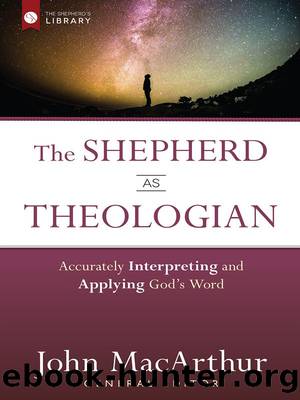The Shepherd as Theologian by John MacArthur

Author:John MacArthur
Language: eng
Format: epub
ISBN: 9780736962124
Publisher: Harvest House Publishers
PRAYER
Father, we understand that we stand before You by grace alone, through faith alone, and in Christ alone. We pray that You would increase our love for the sweetness of that gospel, that we might have a clearer understanding of it and a passion to communicate and defend it wherever that battle rages. We ask You in Jesus’ name and for His sake. Amen.
THE EXTENT OF THE ATONEMENT
“[He] is the Savior of all men, especially of believers.”
1 T IMOTHY 4:10
7
THE EXTENT OF THE ATONEMENT
Phil Johnson
Shepherds’ Conference 2003
Selected Scriptures
For whom did Christ die? Did the Good Shepherd give His life for the sheep, or did He die for all people without exception? Did He merely make forgiveness possible for anyone and everyone, or did He actually secure redemption for the elect? What, precisely, did God intend to accomplish through the death of His Son—and will His design be fully realized? Above all, is there a limit to the worth or value of the atoning sacrifice Christ offered?
Those questions are all part of the perennial debate between Calvinists and Arminians regarding the extent of the atonement. They are important and valid questions—but only if we can first agree on the question of how the death of Christ made atonement for sin.
Scripture says “Christ died for our sins” (1 Corinthians 15:3)—“the just for the unjust” (1 Peter 3:18). God “made Him who knew no sin to be sin on our behalf, so that we might become the righteousness of God in Him” (2 Corinthians 5:21). “Christ redeemed us from the curse of the Law, having become a curse for us” (Galatians 3:13). He “was delivered over because of our transgressions” (Romans 4:25). “He was pierced through for our transgressions, He was crushed for our iniquities; the chastening for our well-being fell upon Him” (Isaiah 53:5).
Those statements are clear, and this is by far the most vital truth to understand about the crucifixion: It was a substitutionary sacrifice. Christ died in the place and in the stead of those whom He saves. His death on the cross paid the penalty of their sin in full. He suffered everything condemned sinners deserve under the wrath of almighty God. In return He gives believers a right standing before God, with immense, eternal blessings that only He rightfully deserves. Those who trust Him alone as Savior are spiritually united with Him, and His righteousness counts as theirs. Having fully atoned for their sins, He now covers them with the glorious garment of His own absolute perfection.
One’s view of the extent of the atonement is comparatively insignificant next to the all-important truth that Christ’s suffering and death were a vicarious payment of sin’s penalty—a penal substitution. On that issue all truly evangelical Protestants have historically been in full agreement. Individuals and denominations who have experimented with alternative theories about the atonement have invariably drifted into liberalism, pietism, sacerdotalism, or other forms of works-based religion. In other words, when someone abandons the principle of penal substitution, that person has already moved outside the circle of evangelical orthodoxy.
Download
This site does not store any files on its server. We only index and link to content provided by other sites. Please contact the content providers to delete copyright contents if any and email us, we'll remove relevant links or contents immediately.
Joan of Arc by Mary Gordon(3256)
Victory over the Darkness by Neil T. Anderson(2384)
The Gnostic Gospels by Pagels Elaine(2025)
Devil, The by Almond Philip C(1898)
The Nativity by Geza Vermes(1847)
The Psychedelic Gospels: The Secret History of Hallucinogens in Christianity by Jerry B. Brown(1824)
Going Clear by Lawrence Wright(1568)
Going Clear: Scientology, Hollywood, and the Prison of Belief by Lawrence Wright(1568)
Barking to the Choir by Gregory Boyle(1504)
A TIME TO KEEP SILENCE by Patrick Leigh Fermor(1496)
Old Testament History by John H. Sailhamer(1494)
Augustine: Conversions to Confessions by Robin Lane Fox(1470)
A History of the Franks by Gregory of Tours(1395)
The Knights Templar by Sean Martin(1390)
The Bible Doesn't Say That by Dr. Joel M. Hoffman(1371)
A Prophet with Honor by William C. Martin(1371)
by Christianity & Islam(1345)
The Amish by Steven M. Nolt(1252)
The Time Traveler's Guide to Medieval England by Ian Mortimer(1213)
